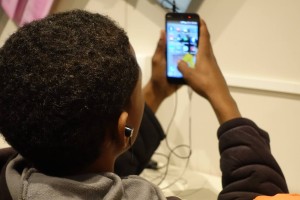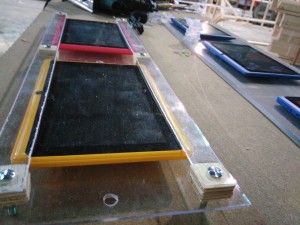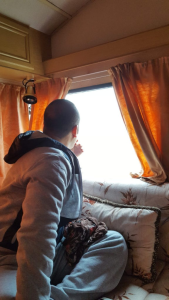This is the first in a series of stories to meet the people behind projects that connect refugees to life-saving technologies.
“I can see how much this project means to refugees here in Calais, and I dream that more people could benefit.”
Acknowledged as a basic human right by the United Nations, a refugee’s need for Internet connectivity has been well documented – from helping talk to friends and family back home, to navigating Europe’s tricky borders. Most recently, refugees in Greece stopped rioting in order to let the WiFi repair men work, with Quartz reporting that, “being connected is almost as important as being fed.”

But for migrants and refugees stuck in the makeshift ‘Jungle’ camp in Calais, a lack of basic infrastructure means that getting online is a constant struggle.
That is, until the Refugee Info Bus stepped in.
After volunteering in the Jungle Books library, Info Bus co-founders Rowan Farrell and Sarah Story realized that two vital services were largely missing from the camp: legal information on refugee rights and Internet access.
Though Sarah is has a background in legal work with Asylum Seekers in the UK and is currently studying a LLB in Scots law, neither have a technical background.
“The whole idea behind the grassroots humanitarian relief here in Calais from the very start, is that if nobody else is going to do it, then you have to,” Rowan explained. “And you do it in solidarity, hand in hand with the refugees that you are helping; making things better together.”
A converted horse box, bought with the support of Help Refugees, acts as a mobile tech hub, primarily supplying free internet access, phone charging stations and digital literacy via tablet and laptop terminals.

Starting with small SIM-operated WiFi routers that could only accommodate 15 users at a time, they would pool together their smartphones and turn them into hotspots so that a few more people could get online.
Today, the Info Bus has a much larger set-up, thanks to a partnership with The Worldwide Tribe.
The hugely popular organization now accommodates up to 150 people at a time and averages 500 unique users over a 4 hour period.
“Each SIM card has a data limit of 50GB a month, so even with some data forming (limiting YouTube quality and a maximum download speed, no torrents, etc.) we still go through 3 or 4 SIM cards a week. This is obviously far more expensive than wired broadband, but there is no electricity in the camp, let alone a phone line.”
So what do people get up to online? “It’s mostly social media and lots of voice calls.”
Because it is such a lifeline to the outside world, turning it off can be incredibly difficult.
“I say ‘OK, finish in 20 minutes’ and they say ‘OK, no problem 20 minutes’. 30 minutes later, I say ‘OK, finish now’ and someone says ‘my friend 80%’ I look at him downloading WhatsApp or Facebook or something. ‘OK, when this guy gets to 100’ and then someone is on to their Mum, or downloading pictures of their kids. But I finally say, ‘my friends! I need to go to sleep’ and they all finally go, ‘OK, OK, thank you so much, same time tomorrow? Where will you be exactly?’ Maybe I should sleep in it and leave it on.”

The Info Bus hopes to expand in the near future. “I can see how much this project means to refugees here in Calais, and I dream that more people could benefit.”
You can follow the Info Bus’ story on Twitter and Facebook. You can also donate to the project here: https://mydonate.bt.com/fundraisers/refugeeinfobus
Rowan (@Rowan_Farrell) will be speaking at Techfugees Cambridge’s event this Saturday 2nd of July! www.rowanfarrell.co.uk